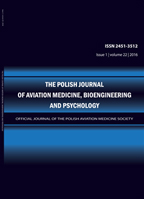2018, Volume 24, Issue 3
EVALUATION OF NUTRITIONAL STATUS AND THE LEVEL OF PHYSICAL FITNESS OF MILITARY FLYING PERSONNEL STAYING AT THE TRAINING CAMP
Agata GAŹDZIŃSKA1, Paweł JAGIELSKI2, Paulina BARAN3
-------------------------------------------------------------------------------------------------
1Department of Pathophysiology and Flight Safety, Military Institute of Aviation Medicine
2Department of Nutrition and Drug Research, Faculty of Health Science, Jagiellonian University, Medical College
3Department of Flight Simulator Innovations, Military Institute of Aviation Medicine
Autor korenspondencyjny: Agata GAŹDZIŃSKA; Department of Pathophysiology and Flight Safety, Military Institute of Aviation Medicine; email: agazdzinska@wiml.waw.pl
Full text
Streszczenie
Introduction: The aim of the conducted research was to assess the nutritional status and level of physical fitness of the military flying personnel staying at the three-week training camp in Zakopane-Gronik.
Material and methods: The research involved 90 members of the military flying personnel staying on a three-week camp in the Military Training and Fitness Centre (WOSzK) in Zakopane. The mean age of the respondents was 34.57±7.14 years. At the beginning and at the end of the camp period the body composition was measured and anthropometric tests were performed. In order to assess physical fitness, the scores from a physical fitness test carried out on the last day of the camp were used.
Results: During the training and fitness camp period, significant improvements (p < 0.05) were observed in the nutritional status of military flying personnel, including the content of body fat (20.14±4.02 vs. 19.50±3.89%), visceral fat (6.48±2.79 vs. 6.16±2.65), muscle mass (61.23±5.61 vs. 61.77±5.61 kg), total body water (44.59±3.70 vs. 44.75±4.42 kg) and waist circumference (88.51±6.78 vs. 87.18±6.72 cm), and basal metabolism (1891.5±78.5 vs. 1903.9±177.3 kcal). 62.2% of the examined participants of the camp obtained a very good final score in the fitness test in all of the disciplines assessed, which indicates their high physical fitness. The soldiers who obtained a very good final score from the exam were younger (33.39±7.08 vs 36.50±6.92; p < 0.05) and had lower content of body fat (18.73±3.89 vs 20.77±3.53; p < 0.05) compared to those who obtained a good final score.
Conclusions: In connection with the improvement of nutritional parameters of the military flying personnel, as well as their high physical fitness shown in the study, it should be concluded that training and fitness camps play an important role in maintaining high psychophysical fitness of the participants.
Słowa kluczowe
nutritional status, physical fitness, training camp, military flying personnel
